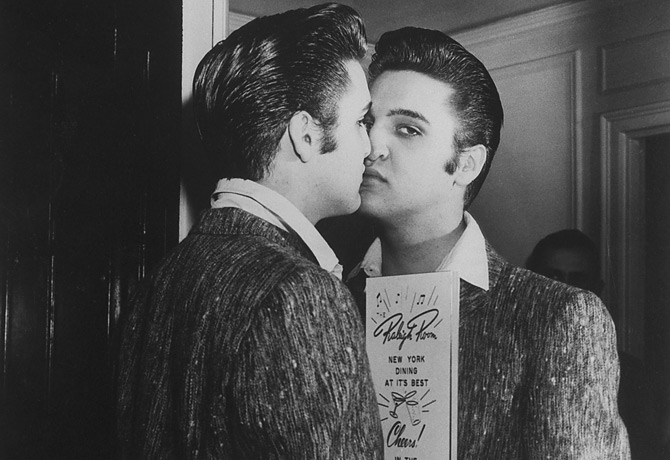
Stolen from here.
http://hobbiesandpastimes.blogspot.com/2007/06/voices-of-elvis-presley.html
“The voice covers two octaves and a third, from the baritone low-G to the tenor high B, with an upward extension in falsetto to at least a D flat. Presley’s best octave is in the middle. D-flat to D-flat. Call him a high baritone.” “Moreover, he has not been confined to one type of vocal production” “He is a naturally assimilative stylist with a multiplicity of voices – in fact, Elvis’ voice is an extraordinary voice, or many voices.” – (Henry Pleasants, The Great American Popular Singers)
“I suppose you’d call him a lyric baritone, although with exceptional high notes and unexpectedly rich low ones. But what is more important about Elvis Presley is not his vocal range, nor how high, or low it extends, where its center of gravity is. By that measure, Elvis was all at once a tenor, a baritone and a bass, the most unusual voice I’ve ever heard.” – (Gregory Sandows, Music Professor at Columbia University)
“He rarely over-sang when recording, delivering a vocal to suit the song.” – (Paul Simpson, The Rough Guide To Elvis)
“(He) could jump from octave to countless other octaves with such agility without voice crack, simultaneously sing a duet with his overtones, rein in an always-lurking atomic explosion to so effortlessly fondle, and release, the most delicate chimes of pathos.” – (Mike Handley, narrator and TV/radio spokesman)
“..a musician … pointed out that despite an impressive vocal range of two and a half octaves – something approaching perfect pitch -, Elvis was willing to sing off-key when he thought the song required it. Those off-key notes were art.” – (Patrick H. Adkins, The Dream Vaults of Opar)
“The guy had a variety in his vocal styles and approach; he could make more vocal tones, with just his voice, than a guitar player with 50 pedals and gadgets. If you never even saw the guy, you could plain feel, not just hear the emotion and passion in his voice.” – (Country singer Roger Wallace)
“The voice has mixed propensities, hovering between tenor and bass and everything in between. Even a convincing falsetto lay within his range.” – (Jackson Baker in Memphis Magazine)
“There is nothing wrong, and everything right, in opening the vowel in the higher register so that the higher notes can be sustained. Elvis Presley was very open in his singing style even though he was ‘the’ rock and roller.” – (Brian Gilbertson, world-famous voice teacher)
“Presley’s registration, the breadth of his tone, listening to some of his records, you’d think you were listening to an opera singer. But …it’s an opera singer with a deep connection to the blues.” – (Jerry Wexler, co-founder of Atlantic Records)
“…Elvis’ range was about two and a quarter octaves, as measured by musical notation, but his voice had an emotional range from tender whispers to sighs down to shouts, grunts, grumbles and sheer gruffness that could move the listener from calmness and surrender, to fear. His voice can not be measured in octaves, but in decibels; even that misses the problem of how to measure delicate whispers that are hardly audible at all.” – (Lindsay Waters, Come Softly, Darling, Hear What I Say)
